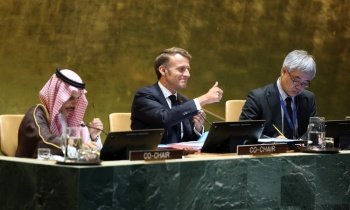The opening of the UNs General Assembly spotlights a desire for peace in Israel and Palestine

Over the last week of September, world leaders gathered in New York for the opening of the 80th session of the United Nations General Assembly. Amid the ongoing genocide being perpetrated by Israel in Gaza, several countries used the United Nations as a platform to officially recognize the State of Palestine. Additionally, nearly 150 nations participated in a High-Level UN conference focused on ending the war in Gaza and achieving a two-state solution, and dozens of leaders used their speeches to the General Assembly to call for the return of hostages, access for humanitarian aid, and respect for international law. These recognitions constitute significant symbolic and diplomatic moves towards the actualization of a fully independent Palestinian state. Furthermore, despite criticisms of the institution’s continued effectiveness, nations’ choices to make these recognitions and calls to action at the UN demonstrate the continued desire of the international community for the UN to play a leading role in global peacebuilding and in achieving lasting peace for Palestinians and Israelis. However, efforts to stop the ongoing genocide will require commitment from the international community beyond recognition.
Between 21 and 22 September, ten new nations joined approximately 81% of the world’s nations in recognizing Palestinian statehood. Several of the ten, including France, Belgium, and Malta, officially recognized Palestine at a high-level conference at the United Nations on the issue of Gaza and the two-state-solution on 22 September, Others such as the United Kingdom, Canada, and Australia, used the conference as a venue to highlight their recognition, having commenced formal proceedings in their capitals the day prior. Between states, recognition means accepting the other as an equal, independent nation, respecting the existence of the other’s sovereign territory and government, and paving the way for increased diplomatic, economic, and security relations. For citizens, mutual recognition can enable easier travel, more favorable import and export conditions, and simplified financial transfers. In the context of Palestine, the gradual wave of recognitions increases pressure on Israel and its allies, such as the United States, to stop the genocide in Gaza and come to the negotiating table on a two-state solution. It also opens the door for Palestine to participate in a wider array of international diplomatic, economic, and legal forums. French President Emmanuel Macron pointed out that such recognition may serve as a barrier against “the worst which could still come to pass,” such as military escalations, forced expulsions, annexations, or “effects that could irreversibly change the situation on the ground.”
While this recent flurry of recognitions is significant, many Arab and Muslim leaders have pointed out that recognition on its own will not end the genocide or ongoing Israeli violations of international law. As King Abdullah II of Jordan reiterated in his speech at the General Assembly, recognition of Palestine must be a “step in a continuing effort to realize [the two-state solution]” which will require significant ongoing buy-in from the international community in order to avoid the risk of such recognition becoming merely symbolic.
The focus on the genocide in Gaza and the recognition of Palestine throughout this year’s General Assembly reflects not only the level of devastation and urgent need for international action in Gaza, but also serves as an implicit acknowledgment by the international community of the ongoing need for a UN role in ensuring a just and lasting peace. Both major powers and smaller states have expressed concerns over recent years about the UN's relevance, effectiveness, and gridlock in the modern era. This concern has been particularly evident as Russia and the United States continue to use their veto powers in the Security Council to prevent UN action on the conflicts in Ukraine and Gaza. Despite these concerns, the fact that states have returned to the UN as the venue to recognize Palestine, to seek expert testimony, to hold critical discussions, and to add to the ever-growing pressure on Israel and its allies, shows that the majority of nations see an ongoing need for the UN in peacebuilding despite its flaws.
Recognizing the ongoing significance of the United Nations in pursuing justice and peace, the Quaker UN Office was active around both the High-Level conference and the General Assembly. In the lead up to both events, QUNO staff supported colleagues from the American Friends Service Committee (AFSC), as well as Amnesty International, Human Rights Watch, and Oxfam, in hosting an event in New York to call attention to Israel’s “One Year of Contempt” for UN General Assembly deadlines and International Court of Justice findings against the illegal Israeli occupation of Palestinian territory. QUNO staff also attended a panel where AFSC colleague Nusaiba Mubarak spoke on the challenges of delivering aid amidst the current humanitarian crisis. QUNO staff continue to closely monitor developments at the United Nations and elsewhere pertaining to the situation in Gaza, recalling the need for lasting peace, justice, and accountability, as the world marks two years since the violence of October 7, 2023.


